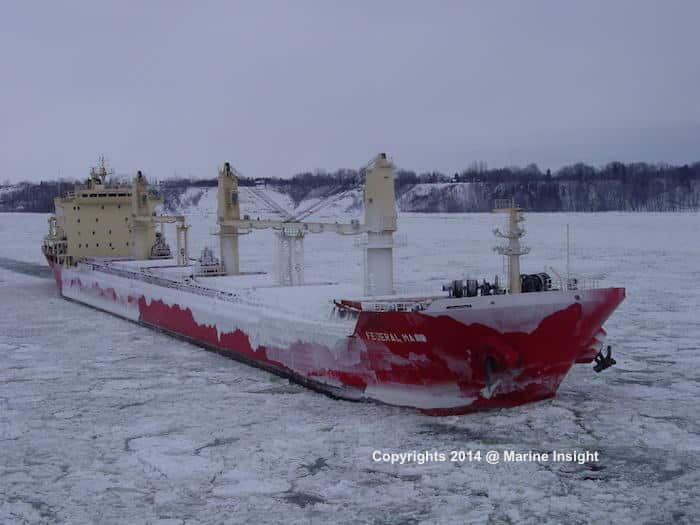

Hypothermia is a condition that results when a body is exposed to extreme cold weather condition. When a ship’s crew member falls in to the water by accident or is exposed to extreme condition while working on deck, it has been observed that majority of the times a fatal condition is reached because of hypothermia.
Hypothermia will occur when the temperature of human body temperature falls below 35℃. The mortality rate of hypothermia ranges from 20% to 90%, hence looking at the numbers, it can surely be considered as a dangerous condition.
Depending upon the temperature of the surrounding, i.e. air and water temperature, the time taken by a body to reach the hypothermia state will vary.
Usually, there can be two situations when a person is exposed to hypothermia:
Accidental Hypothermia: If a person meets with an accident i.e. falling in cold water, exposed to extended extreme weather etc.; such unforeseen situation can lead to hypothermia.
Secondary Hypothermia: If a person has already been ill or in poor health condition, consuming wrong drugs, or is in poor recovery condition, it can lead to low body temperature, causing secondary hypothermia.
As seafarers work near water and sometimes in cold regions, they are more prone to accidental hypothermia.
In case of man overboard accident in cold water or extreme cold weather, the survival instinct of a human will keep him/her afloat but hypothermia will lead to major drop in body temperature and senses, eventually leading to drowning or unconsciousness.
Hypothermia is a combination of two different word- “Hypo” meaning water and “Thermia” meaning temperature. The words are combined to form what describes a body condition wherein the temperature within the body drops below the normal temperature required for proper functioning of the human body.
The human body maintains a temperature of 36-37℃ in normal conditions using hypothalamus, a central part of the brain which monitors the body temperature using nerves.
The hypothalamus will contract and expand the blood vessels to control the flow of the blood to adjust and maintain the body temperature.
However, if the body is involved in an accident or it has been long exposed to extremely cold conditions, the brain will not be able to make the adjustments, leading to reduction in body temperature or hypothermia.


There are mainly three stages of hypothermia, depending upon the drop in body temperature and the body’s metabolism rate. They are –
1. Mild Hypothermia
Mild hypothermia occurs when the body temperature drops to 35-32 ̊°C. The effects of mild hypothermia are:
2. Moderate Hypothermia
Moderate hypothermia happens when the body temperature drops to 32 – 28 ̊°C. The effect of moderate hypothermia are:
3. Profound Hypothermia
Profound or severe hypothermia is an alarming state when the body temperature drops below 28̊°C. The effects of profound hypothermia are:
If the body temperature drops below 22°C, the person will be unable to breathe any further and reduction of body temperature below 20̊°C will lead to cardiac arrest.
Seafarer onboard ships work in various temperatures and weather conditions. They can experience hypothermia:
Under hypothermia, seafarer’s physical condition will vary as a person not having food or working under the influence of alcohol will have less ability in the body to increase or maintain the body temperature
As explained above about the different ways seafarer can be affected by hypothermia, let us assume if the seafarer fells in water. In such cases, the following things to be done immediately by the ship’s staff:
A normal human body temperature is considered to be at 35-37 ̊°C. If the body temperature drops below this, the condition of hypothermia is reached. Effects of hypothermia are:
It is very important to wear personnel protective cold gear when working in cold atmosphere. Following precautions must be taken onboard to prevent hypothermia-
Disclaimer: The authors’ views expressed in this article do not necessarily reflect the views of The Marine Learners. Data and charts, if used, in the article have been sourced from available information and have not been authenticated by any statutory authority. The author and The Marine Learners do not claim it to be accurate nor accept any responsibility for the same. The views constitute only the opinions and do not constitute any guidelines or recommendation on any course of action to be followed by the reader.
The article or images cannot be reproduced, copied, shared or used in any form without the permission of the author and The Marine Learners.










We believe that knowledge is power, and we’re committed to empowering our readers with the information and resources they need to succeed in the merchant navy industry.
Whether you’re looking for advice on career planning, news and analysis, or just want to connect with other aspiring merchant navy applicants, The Marine Learners is the place to be.